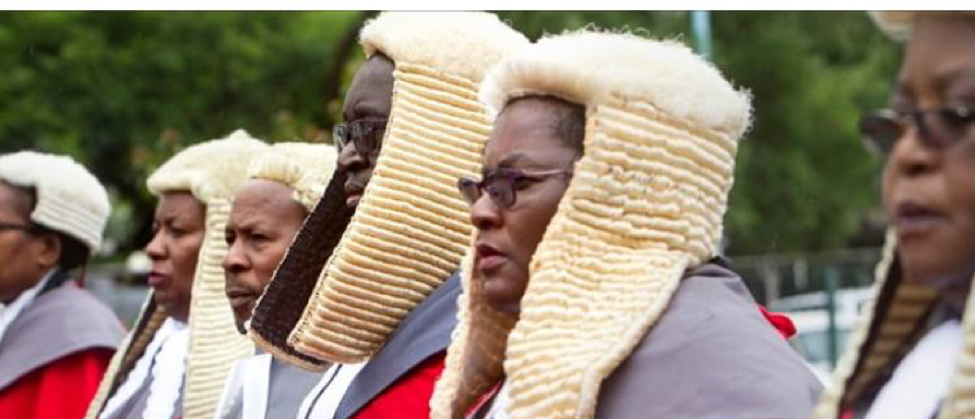Of Stare Decisis and The Supreme Court of Ghana
 Recent decisions of the Supreme Court appear to create more uncertainty about the state of the law than settle the principles of law. As the highest Court of the land whose decisions are binding on all other courts, one would expect that the Supreme Court will be consistent on points of law so as to guide all other courts. But this has not been the case in recent years. Despite there being one Supreme Court, the state of the law keeps changing from case to case, from one panel of the Supreme Court to another, and even from the same Judges in different cases.
Recent decisions of the Supreme Court appear to create more uncertainty about the state of the law than settle the principles of law. As the highest Court of the land whose decisions are binding on all other courts, one would expect that the Supreme Court will be consistent on points of law so as to guide all other courts. But this has not been the case in recent years. Despite there being one Supreme Court, the state of the law keeps changing from case to case, from one panel of the Supreme Court to another, and even from the same Judges in different cases.
A few examples, in this case, will be necessary to guide the analysis. In In re Presidential Election Petition; Akufo-Addo and Others v Mahama and Others,[1]the National Democratic Congress (NDC) who was not a party to the original action, but who had sponsored the 1stRespondent for the elections applied to be joined to the action under rule 45(4) of the Supreme Court Rules, 1996 (C.I. 16) which provides as follows:
The Court may at any time on its own motion or on the application of a party, order that any other person shall be made a party to the action in addition to or in substitution for any other party [emphasis supplied].
The Respondents argued that by the Rules, only a party may bring an application for joinder and since the NDC was not a party to the action, their application was improper. The Court unanimously overruled this objection holding that any person may apply to be joined provided his/her presence is necessary for the final and effective adjudication of all matters in controversy. Akoto-Bamfo JSC delivering the lead judgment for the majority held as follows:
Generally, a plaintiff who conceives that he has a cause of action against a defendant is entitled to pursue his remedy against that defendant and cannot be compelled to proceed against other persons whom he has no desire to pursue. Nevertheless, a person who is not a party may be added as a defendant against the wishes of the plaintiff on his own intervention or on the application of the defendant or in some cases by the court of its own motion. [emphasis supplied]
Atuguba JSC, in his concurring opinion, was more forceful when he stated that:
Since this rule empowers this court “at any time on its own motion” to join further parties, it matters little whether the applicant herein is “a party” or not….It is trite law that the expression “include” except where there is manifested an intention that it should do so, does not have an exclusive connotation in a statutory definition, unlike the word “mean”. There is no such manifestation of intent here. I should therefore hold that the word “party” in the context of this provision includes an interested party. [emphasis added]
It must be noted that, although the main issue whether to join the NDC or not was by a 6 – 3 majority, (Atuguba, Adinyira, Owusu, Dotse, Gbadegbe and Akoto-Bamfo JJSC; Ansah, Anin-Yeboah and Baffoe-Bonnie JJSC – dissenting), the Court was unanimous on whether a person who is not a party to the original action can apply to be joined as a party. Baffoe-Bonnie JSC who wrote the lead minority opinion stated the principle as follows:
By the rules of procedure, a person can be joined to an action on his own application, a party, or even the court [Emphasis supplied]
Similarly, Anin-Yeboah JSC who concurred in the minority opinion, after reviewing several cases stated as follows:
It is trite learning that joinder application could be brought by either party to the action or the court on its own motion. Thirdly we have joinder applications from a person who comes by way of intervener and not at the behest of either the parties or the court on its own motion. [Emphasis supplied]
I have quoted ad longum from the Ruling so that the issues following may be better appreciated.
The same issue which had been determined by the Court arose subsequently in Abu Ramadan v Electoral Commission and Attorney-General (No. 2).[2]The Peoples’ National Convention (PNC) applied to be joined to a matter raising issues about the propriety of the Voters’ Register to be used for the 2016 General Elections. The Supreme Court (Coram: Wood, CJ, Dotse, Anin-Yeboah, Baffoe-Bonnie, Gbadegbe, Benin and Akamba JJSC) unanimously held that only a party to the original action can apply to join another person and that non-parties have no capacity under rule 45(4) of the C.I. 16 to apply for joinder. The Court, speaking through Gbadegbe JSC, held as follows:
In our view, the applicant does not come within the designation of “a party” within the meaning of rule 45(4) of the Supreme Court Rules. The said rule provides as follow… The above rule appears to be narrower in scope than the formulation contained in Order 4 rule 5(2) of the High Court (Civil Procedure) Rules by which the application for joinder is authorised to be made not only by parties to the action but “on application” presumably of any person. As rule 45 (2) only authorizes an order for joinder in the exercise of our original jurisdiction to be made either at our own instance or on the application of a party to a pending matter, which the applicant, unfortunately, is not, the applicant lacked the requisite capacity to bring the application for joinder.
It is to be noted that four of the Judges who decided the Abu Ramadan case were on the panel in the Election Petition case (i.e. Gbadegbe, Dotse, Anin-Yeboah and Baffoe-Bonnie). What is intriguing is that the Court did not refer to its previous decision in In re Election Petition, which was referred to the Court in course of proceedings, and which decision was binding on the Court.
Another example is the issue of whether a Court can relist an application which has been struck out without a formal application by the party seeking the relistment. In Republic v High Court; Accra ex parte Eyiti,[3]the Court (Coram: Atuguba, Akufo, Baffoe-Bonnie, Gbadegbe and Akoto-Bamfo JJSC), held, with Atuguba JSC dissenting, that in the absence of a formal application, the High Court had no jurisdiction to relist an application which had been struck out. In the same year that this decision was delivered, the same question arose in Westchester Resources Ltd v Ashanti Goldfields Ltd[4](Coram: Atuguba, Adinyira, Gbadegbe, Benin and Akamba JJSC). One would have thought that the Court will just apply its reasoning in the previous case or give reasons why it is necessary to depart from that decision. But that was not the case. Atuguba JSC who dissented in the previous decision wrote the unanimous decision of the Court, and without referring the decision in ex parte Eyiti, held that a Judge has the discretion to relist an application which has been struck out without a formal application. Indeed, His Lordship added that this could even be done sub silento by dealing with the application as if it had not been struck out without formally relisting it.
It must be noted that the Court did not even refer to the previous decision in ex parte Eyiti, although some members of the panel that decided Westchester Resources were also on the panel that decided ex parte Eyiti.
The last example to be utilised is the issue of when to raise questions of capacity. While in Standard Bank Offshore Ltd v National Investment Bank[5]the Court affirmed the age-old principle that objections to capacity can be raised at any time even for the first time on second appeal, the Court has recently held Adisa Boya v Zenabu Mohammed[6]that party who fully participates in proceedings may lose his/her right to object to the capacity of the other party. While the Court in the former case strongly advocated compliance with Rules on the pain of rendering proceedings a nullity, the Court in the latter case stressed the need to do substantial justice rather than a “slavish adherence to mere technicalities.”
Undoubtedly, the Supreme Court has the power under article 129(3) to depart from its previous decisions. This, however, must be done expressly and for stated reasons. The Court itself, explaining the ambit of article 129(3) in Republic v High Court, Accra; ex parte Minister of Interior and Comptroller of Immigration[7]held that:
Article 129(3) of the Constitution 1992 enables this court to depart from its previous decision. And it means the existing law must be clearly stated and the point/s of departure must equally be clearly stated, without equivocation.
Indeed, under article 129(3) of the Constitution, the Supreme Court is bound by its previous decisions although it is empowered to depart from same when “it appears right to do so.” In so doing, the Court must state the previous position and give reasons why it is right to do so. Thus, in Agyemang v Anane,[8]when the Court felt the need to depart from its previous decision in Awudome Stool v Peki Stool[9]which gave parties, instead of the Court, the power decide whether to adopt proceedings before a new Judge or to start the action de novo, the Court gave cogent reasons justifying the need for the departure. Wood CJ, speaking for the Court explained at pp. 253 – 256 as follows:
We concede that the time is long overdue for a volte-face from the age–old legal position of no agreement by all the parties, no adoption of previous evidence in civil cases, which the courts have unremittingly followed for decades. At this re-hearing, we will not tie ourselves to the existing legal principle, but liberate ourselves from its shackles…. This case provides us with the opportunity to utilise the jurisdiction conferred on us by article 129 (3) of the 1992 Constitution to depart from our previous decision in Awudome (Tsito) Stool v Peki Stool [2009] SCGLR 681 which we find rather archaic, retrogressive and producing unjust results….The argument by the learned Editor against de novo hearing is so cogent and compelling that sound case management policy reasoning alone constitutes a sufficient basis for charting a new legal path in our jurisprudence. We would, therefore re-state the law relating to adoption of evidence in previous civil proceedings as follows. In civil proceedings, the ultimate question of whether or not evidence already adduced before a previous judge be adopted should not rest on the parties’ consent. It should exclusively be at the discretion of the new judge who takes over the partly-heard case.
It is submitted that this is accepted constitutional means of departing from previous decisions. Where the Court departs from its previous decisions without reference to that decision or without giving reasons for such departure, the new decision will be deemed per incuriam as it would have been given against a binding decision of the Court. The Bar has a duty to assist the Court by submitting well-researched addresses to assist the Court in doing substantial justice.
[1][2013] SCGLR (Special Edition) 1
[4]Consolidated Civil Appeal No. J4/63/2013 dated 11th November 2015
[5]Unreported, Civil Appeal No. J4/63/2016 dated 21st June 2017
[6]Civil Appeal No. J4/44/2017 dated 14th February 2018
[7]Unreported Civil Motion No. J5/10/2018, dated 8th March 2018




Hey there! This is my first visit to your blog! We are a
team of volunteers and starting a new project in a community
in the same niche. Your blog provided us beneficial information to work on. You have done a marvellous job!
Hi there friends, good paragraph and pleasant urging commented here, I am really
enjoying by these.
I spent a great deal of time to locate something
similar to this
Thanks to the wonderful guide
Thanks for the great guide
Thanks, it’s very informative
I spent a great deal of time to find something like this
Thanks to the terrific manual
Thank you for the wonderful post
Thanks, it is quite informative